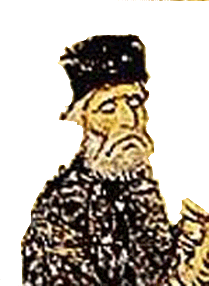Psellus on Demons 
A translation of Michael Psellus' oft-cited Dialogue of the Operation of Demons has not been made available on the web, although innumerable other classic texts on the subject have. As I happened to have a xerox copy (courtsey of my old friend Stephen Skinner) of the rare 1843 Collison translation of the Dialogue into English, I though it might be useful to transcribe this interesting text for other readers.
I have transcribed what I could, and the main text is pretty much complete, although I cannot guarantee the Latin or Greek. In addition, there are two passages in Latin that Mr. Collison dared not render into English. My wife, who was a classics major years ago, has made a stab at what these say, but if anyone could improve upon these notes and send us the translation, we would be very grateful. The original pagination is indicated by slashes and page numbers.
PSELLUS’ DIALOGUE
ON THE
OPERATION OF DAEMONS (6)
51
NOTES.
(a) Manes and the Euchites.—On the overthrown of the credit and authority of the Gnostic sect in the third century, Manes, or Manichaeus, by birth a Persian started up originally a Magian philosopher. He was instructed in all those arts esteemed in Persia and the neighboring nations, and was thoroughly versed in astronomical science. “His genius,” says Mosheim, “was vigorous and sublime, but redundant and ungoverned, and he was presumptuous enough to attempt to blend the Magian philosophy with the Christian faith.” Mosheim gives a long statement of his peculiar doctrines, which differs in nothing from what is related of them in this work, except that it supplies many matters which are here omitted. It may astonish us now how he could gain partizans from the Christian body to his fantastic system, the more especially as e prescribed the most rigorous and self-denial, prohibiting to the higher order of his followers (the Elect, as he called them) not merely sensual indulgences, but the most innocent gratifications; he surmounted every difficulty, however, by announcing himself the promised Paraclete, who was to instruct and guide them into all truth. By virtue of this his pretended character, he pronounced the Old Testament the work of the Prince of Darkness, and the four gospels, he asserted, were corrupted and interpolated by designing and artful men, and embellished with Jewish fables and fictions; he therefore supplied their place by a gospel which, he said, was dictated to him by God himself, and which he distinguished by the title of Erteng. He rejected the Acts of the Apostles, and though he acknowledged the epistles that are attributed to St. Paul to be the productions of the divine Apostle, yet he looked upon them as considerably corrupted and falsified in a variety of passages.—Euchitae, or Massalian, (the former being the Greek, the latter the Hebrew, name), signifying praying-men, was a sort of general epithet for persons distinguished for gravity of manner, and was applied in the east with much the same latitude of signification as Beghard and Lollard were afterwards employed in the west, and with Puritan in still more modern times; so that many truly pious characters, who dared tom oppose the mummery and superstition of the dark ages, were loaded with the opprobrious epithet Euchitae, in common with those wholheld most revolting /
52
sentiments, and who, from very different motives, opposed the existing order of things. Manichaeans were also called by this designation. It was not till the close of the fourth century that the Euchitae made their appearance as a distinct religious body, their name being derived from their habit of communal prayer; they were founded by certain monks of Mesopotamia; their doctrine, according to Mosheim, was as follows:—“They imagined that themind of every man was inhabited by an evil daemon , whom it was impossible to expell by any other means than by constant prayer annd singing of hymns.” To this leading tenent they added other enormous opinions, evidently derived from the source where the Manichaeans derived their errors, viz., the tenents of the oriental philosphy.
(b) Alcinous’ narrative.—Ulysses, feasting with Alcinous, king of the Phoeanians, presuming on the monarch’s ignorance, amused himself at his expense by giving a fictional narrative of his adventures amongst the Lotophagi, Lestrigons, and Cyclops. Hence any lying narrative filled with marvelous adventures, came to be called Alcinous’ narrative, i. e., such a narrative as was delivered for Alcinous’ amusement by Ulysses. The phrase passed into a proverb, and is thus used by Plato, de Repub., lib. x.
(c) The statement of facts is their delineation.—The following is an expression not only of Simonides, but Democritus, λογος εργον σκιη, the narrative of a fact is its shadow.
(d) The impure pen of Archilochus—Archilochus was paying his addresses to the daughter of one Lycambes, and was accepted as a suitor; but a richer candidate for the lady’s had presenting himself, Archilochuswas dismissed. Upon this, Archilochus lampooned Lycambes in Iambic verse, and that with such effect that in a fit of vexation, he committed suicide. Horace, in his Ars Poetica, (v. 79), in allusion to this circumstance, says—
“Archilocum proprio rabies armavit Iambo.”
(e) The following is an expression of Solon: γερασχω δ αει πολλα ύιδασχομενος, “I become old by constantly learning much,” and seems to be the proverb alluded to.
D. L. Welch, Printer, opposite the Post-office.